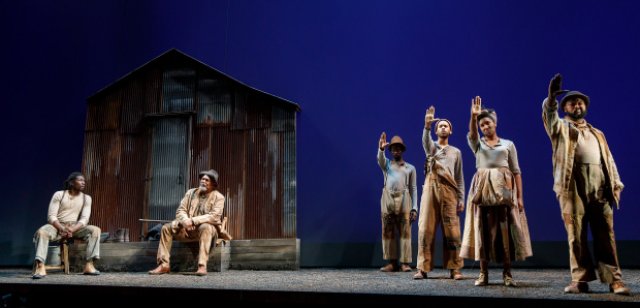Father Comes Home from the Wars – Parts 1, 2 & 3
Pulitzer Winner Suzan-Lori Parks's Play at Yale Rep
By: Karen Isaacs - Mar 29, 2018
Father Comes Home from the Wars, Parts 1, 2 &3 is an epic work in more senses than one. Suzan-Lori Parks has woven a story of a slave during the Civil War and the Greek Odyssey into a compelling story.
Parks is well known to Connecticut theater goers. Several of her plays have been staged at Yale Rep, including the Pulitzer-prize winning Topdog/Underdog, The American Play and Venus.
Parks has said that this play, written in 2014, is the first triptych of what she calls her “up-to-12-part” work which will span centuries, genres and moods.
The War in question is the Civil War and the play is set in West Texas. Part 1- A Measure of a Man introduces us to Hero (James Udom), a slave whose owner “The Colonel” Is going to head to the war and wants Hero to come with him. The other slaves are betting whether he will or will not go and even Hero doesn’t seem sure. A surrogate father figure (The Oldest Old Man) urges him to go while Penny, his woman, wants him to stay home. One incentive for going is that the Colonel has promised Hero his freedom after the war; but he’s made similar promises in the past and hasn’t kept them. To counter Hero is Homer, another slave who knows that Hero does not live up to his name.
By the end of the first part, Hero is going off to war.
Part 2: A Battle in the Wilderness focuses on the Colonel, Hero and a Union officer whom they have captured. The Colonel blusters, harasses the prisoner, and reveals his bigotry, Hero acts as the dutiful servant/slave, carrying and fetching water, firewood and guarding the prisoner. Parks has provided us with a twist in this part of the play. Yet despite opportunities to leave the Colonel, Hero remains his slave.
The Third Part, after intermission, is titled The Union of My Confederate Parts. It is 1863 and while the war is not over, the Emancipation proclamation has been issued. A group of runaway slaves are spending some time with Homer and Penny on the property. The three runaways are waiting until nightfall to leave and are trying to convince Homer to go with them. Homer seems inclined but Penny will not leave. She dreams of Hero nightly and imagines his return. As evening comes, Hero’s dog (Odd-see Dog) arrives and tells the story of what has happened to Hero and the Colonel. Soon it is Hero, who now calls himself Ulysses, who comes up the path.
What is remarkable about this sprawling, episodic work, is the fine direction of Liz Diamond and a splendid cast. Diamond and the cast have melded these three disparate parts into a unified whole. In parts one and three, in addition to the fine work of James Udom as Hero/Ulysses, we have the fine work of Julian Elijah Martinez ad Homer and Eboni Flowers as Penny as well as Steven Anthony Jones as the Oldest Old Man. Each of these actors, creates complete and complex characters.
Part two has just three characters and each gives a fine performance. Udom is the glue holding these pieces together, but in Part 2 he is joined by Dan Hiatt as The Colonel and Tome Pecinka as the captured Union officer.
In addition, Martin Luther McCoy provides the musical commentary (also written by Parks) that helps join the pieces together.
As is usual with Yale productions, the design elements are excellent. Riccardo Hernandez has created the scenic design though there some choices that seem unusual. In Part 2, there are tall, slanting beams (like steel beams) that are supposed to be trees. Yi Zhao has done a fine lighting design and the sound/musical direction by Frederick Kennedy is also very good.
While this obviously draws (and to some extent parallels) Homer’s Odyssey, is other aspects it may leave you puzzled. At times the story telling approach leaves us puzzled by Hero’s motivations and decisions. Given the opportunity to escape with the Union captain, why doesn’t he? At others times, we can only guess at the reasons behind his actions. In addition, even the title is puzzling; Hero/Ulysses is not a father at anytime during the play.
It will be interesting to see Parks continue her series and the direction that it will take. Will it have similarities to August Wilson’s ten play series on African-Americans during the 20th century? Will it continue to reference classical literature/plays for its formats and structure?
Parks is a very talented playwright and therefore to see how she develops this multi-part work will be fascinating.
In the meantime, while three hours in length, Father Comes Home from the Wars – Parts 1, 2 & 3 are well worth seeing. It’s at the Yale Rep’s University Theater on York St. For tickets contact Yale Rep.
Posted courtesy of Two on the Aisle.

